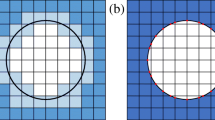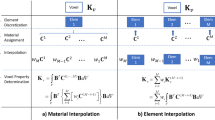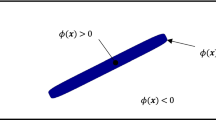Abstract
In this paper, a new feature-based material blending method is proposed to represent and design heterogeneous objects. Geometric features dictating the material variation are defined as material governing features to control material composition inside the objects. Interrelations between the material governing features and material attributes are established by constraining the geometric and material features and retained in the object model. Using these relationships, variant heterogeneous objects are developed easily by changing the geometric and material features of the heterogeneous object. Geometric methods are developed to blend not only the geometric features but also the property requirements at each of the feature. To obtain the best material variation inside the object, an optimization-based solution method based on the object’s functional requirements are developed. Implementation and illustrative examples are also presented in this paper.
Preview
Unable to display preview. Download preview PDF.
Similar content being viewed by others
References
Bhashyam, S., Shin, K.H., Dutta, D.: An integrated CAD system for design of heterogeneous objects. Rapid Prototyping Journal 6(2), 119–135 (2000)
Biswas, A., Shapiro, V., Tsukanov, I.: Heterogeneous material modeling with distance fields. Computer Aided Geometric Design (in Press)
Chen, K., Feng, X.: Computer-aided design method for the components made of heterogeneous materials. Computer-Aided Design 35(5), 453–466 (2003)
Griffith, M.L., Harwell, L.D., Romero, J.T., Schlienger, E., Atwood, C.L., Smugeresky, J.: Multi-material processing by LENSTM. In: Proceedings of Solid Free-form Fabrication, Austin (August 1997)
Huang, J., Fadel, G.M.: Bi-objective optimization design of heterogeneous injection mold cooling systems. ASME Transactions 123(2), 226–239 (2001)
Huang, J., Fadel, G.M.: Heterogeneous flywheel modeling and optimization. Materials & Design 21(2), 111–125 (2000)
Jackson, T.R., Liu, H., Patrikalakis, N.M., Sachs, E.M., Cima, M.J.: Modeling and designing functionally graded material components for fabrication with local composition control. Materials and Design 20(2/3), 63–75 (1999)
Jepson, L., Beaman, J., Bourell, D.L., Wood, K.L.: SLS processing of functionally gradient materials. In: Proceedings of Solid Free-form Fabrication, Austin (August 1997)
Kelkar, A., Koc, B., Nagi, R.: Geometric algorithms for rapidly re-configurable mold manufacturing free-from objects. Computer-Aided Design (in press)
Kelkar, A., Koc, B., Nagi, R.: Rapidly re-configurable mold manufacturing. In: Proceedings of ASME Design and Manufacturing Conference, Chicago (September 2003)
Kumar, V., Dutta, D.: An approach to modeling and representation of heterogeneous objects. ASME Journal of Mechanical Design 120(4), 659–667 (1998)
Lee, Y.-D., Erdogan, F.: Interface cracking of FGM coatings under steady state heat flow. Engineering Fracture Mechanics 59(3), 361–380 (1998)
Liu, H., Maekawa, T., Patrikalakis, N.M., Sachs, E.M., Cho, W.: Methods for feature-based design of heterogeneous solids. Computer-Aided Design (in press)
Ma, D., Lin, F., Chua, C.: Rapid prototyping applications in medicine. Part 1: NURBS-based volume modeling. International Journal of Advanced Manufacturing Technology 18(2), 103–117 (2001)
Markworth, A.J., Saunders, J.: A model of structure optimization for a functionally graded material. Materials Letters 22, 103–107 (1995)
Martin, W., Cohen, H.: Representation and extraction of volumetric attributes using trivariate splines: a mathematical framework. In: Proceedings of the 6th ACM Symposium on Solid Modeling and Applications, pp. 234–240 (2001)
Piegl, L., Tiller, W.: The NURBS Book, 2nd edn. Springer, New York (1997)
Qian, X., Duta, D.: Physics based B-spline heterogeneous object modeling. In: Proceedings of ASME DETC and Computers and Information in Engineering Conference, Pittsburgh (September 2001)
Qian, X., Dutta, D.: Design of heterogeneous turbine blade. Computer-Aided Design 35(3), 319–329 (2002)
Rhinoceros 2.0, Robert McNeel & Associates, Seattle., http://www.rhino3d.com
Sachs, E.M., Cima, M.J., Williams, P., Brancazio, D., Cornie, J.: Three dimensional printing: rapid tooling and prototypes directly from a CAD model. ASME Journal of Engineering for Industry 14(4), 481–488 (1992)
Samanta, K., Koc, B.: Feature-based design and NURBS modeling for heterogeneous objects. In: Proceedings of 12th Annual Industrial Engineering Research Conference, Portland (May 2003)
Samanta, K., Koc, B.: Feature-based design and material blending for free-form heterogeneous object modeling. Computer-Aided Design 37(3), 287–305 (2005)
Samanta, K., Koc, B.: Heterogeneous object design with material feature blending. Computer-Aided Design and Applications 1(1-4), 429–439 (2004)
Samanta, K., Koc, B.: Optimum Matching of Geometric Features for Material Metamorphosis in Heterogeneous Object Modeling. Computer-Aided Design and Applications 4(1-4) (2007)
Samanta, K.: Feature-Based Design and Freeform Modeling for Heterogeneous Objects, M.S. Thesis, Industrial Engineering, University at Buffalo (2003)
Shah, J.J., Mantyla, M.: Parametric and feature-based CAD/CAM. John Wiley and Sons, New York (1995)
Shigley, J.E., Mitchell, L.D.: Mechanical Engineering Design, 4th edn. McGraw Hill, New York (1977)
Shin, K.H., Dutta, D.: Constructive representation of heterogeneous objects. Journal of Computing and Information Science in Engineering 1(3), 205–217 (2001)
Siu, Y.K., Tan, S.: ‘Source based’ heterogeneous solid modeling. Computer-Aided Design 34(1), 41–55 (2002)
Siu, Y.K., Tan, S.T.: Modeling the material grading and structures of heterogeneous objects for layered manufacturing. Computer-Aided Design 34(10), 705–716 (2002)
Weiss, L.E., Merz, R., Prinz, F.B., Neplotnik, G., Padmanabhan, P., Scultz, L., Ramaswami, K.: Shape Deposition Manufacturing of heterogeneous structures. Journal of Manufacturing Systems 16(4), 239–248 (1997)
Author information
Authors and Affiliations
Editor information
Rights and permissions
Copyright information
© 2008 Springer-Verlag Berlin Heidelberg
About this chapter
Cite this chapter
Samanta, K., Koc, B. (2008). Feature-Based Material Blending for Heterogeneous Object Modeling. In: Pasko, A., Adzhiev, V., Comninos, P. (eds) Heterogeneous Objects Modelling and Applications. Lecture Notes in Computer Science, vol 4889. Springer, Berlin, Heidelberg. https://doi.org/10.1007/978-3-540-68443-5_6
Download citation
DOI: https://doi.org/10.1007/978-3-540-68443-5_6
Publisher Name: Springer, Berlin, Heidelberg
Print ISBN: 978-3-540-68441-1
Online ISBN: 978-3-540-68443-5
eBook Packages: Computer ScienceComputer Science (R0)




